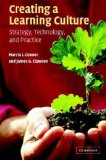 Let’s not start off the new year being trepidatious, shall we? Ok, social engineering and cultural engineering have bad connotations in a number of ways. Yet, if I can talk about learning engineering, the desirable properties of cultures for learning, and moves in that direction, aren’t we really talking about socio-cultural engineering? Can sense be made?
Let’s not start off the new year being trepidatious, shall we? Ok, social engineering and cultural engineering have bad connotations in a number of ways. Yet, if I can talk about learning engineering, the desirable properties of cultures for learning, and moves in that direction, aren’t we really talking about socio-cultural engineering? Can sense be made?
To start with, let me posit that there’s fairly good convergence on the elements that contribute to an effective ‘learning culture’: there needs to be purpose, explicit description and development of skills, tapping into diversity, making it safe to share, responsibility, and more. The point is that we know what makes environments where the best ideas are generated, developed, and put into practice.
The second thing we know, with less certainty but growing awareness, is how to get there. It’s a ground game: being clear, working hard, walking the walk. It’s not easy, as the stories of when the committed leaders moves (or is moved) on and subsequent regression bear out. Yet it can be, and has been, done.
So, if we’re choosing cultural values, and working towards them, both in ways that reflect what science tells us about doing our best, aren’t we really doing such engineering? Yes, social engineering also refers to another means for breaking security systems. And cultural engineering has various legacy implications including ‘culture’ (read: theatre, music, etc) and even misguided political movements in the past. Maybe we need a better term, but I think the concept of moving in a positive environmental direction is something to be considered systematically.
The open question is, does this make sense at a societal level as well? Ok, not going there. But regardless, I reckon that there’s a strong link between learning and the organizational culture. Organizational Development, I guess, is the field that does this, though they seem to not focus on actual skills as much as facilitation. That’s not a bad start, but perhaps there’s an opportunity to break down silos here. Getting these elements aligned. Which, of course, is an organizational change. Pondering, and I welcome your thoughts.
And one of my own first reflections on my post is that it’s ironic: the approach to develop culture is more organic than engineering! We have agricultural science, yet the application of that isn’t agricultural engineering, but farming. Ah, terminology…